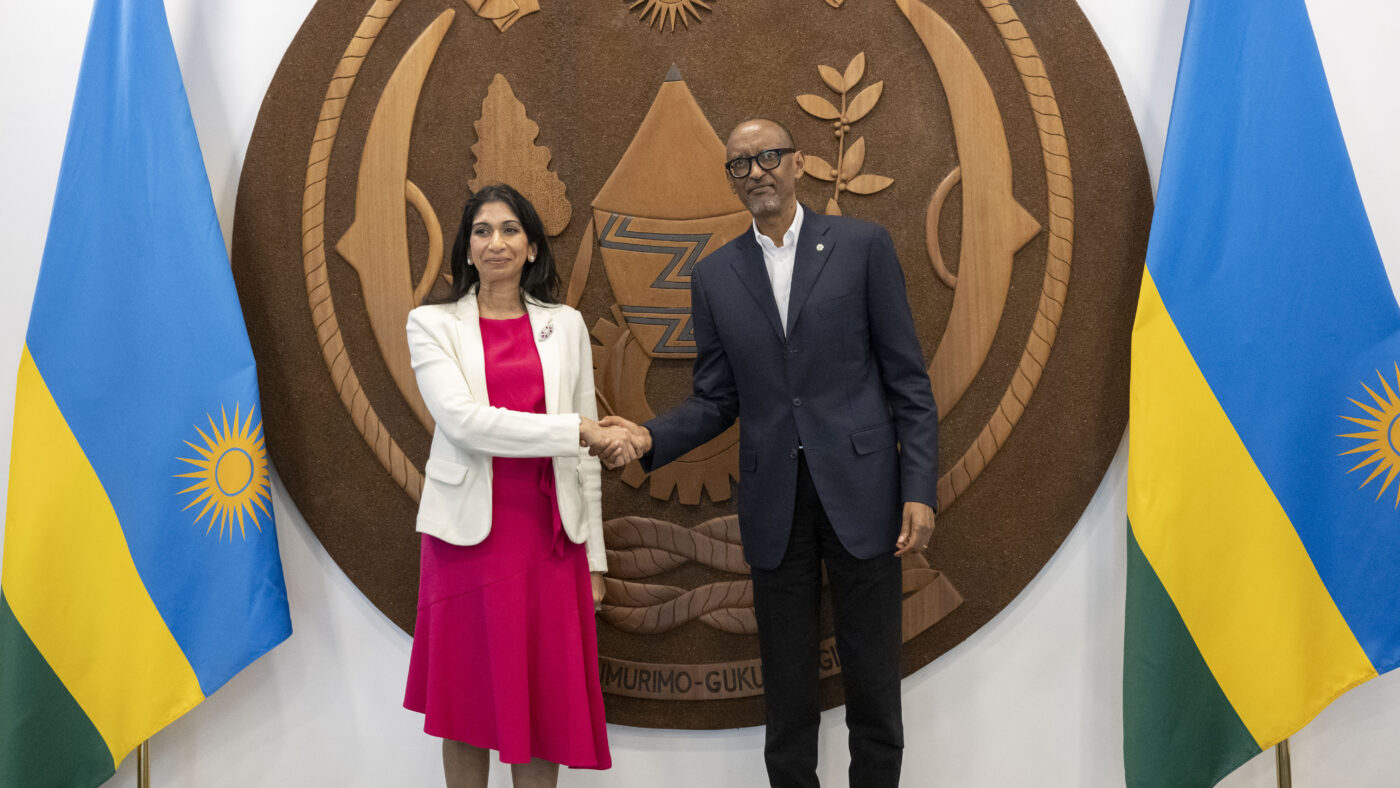Happy birthday, Rwanda plan! The project, as of last Sunday, is officially two years old.
Were the Rwanda plan a child, at this point we could be expecting them to be ‘talking, walking, climbing, jumping, running and bustling with energy’, with a vocabulary that seems to expand faster than the universe.
Yes, obviously the Rwanda plan is not a child, but if it were it wouldn’t even be crawling yet. Much less bustling with energy. As for its vocabulary, it would grasp the meaning of only one word: failure.
Introduced two years ago by Boris Johnson as the Government’s flagship immigration policy, so far the scheme has seen the relocation of zero migrants. Presumably, given the last two years saw consecutive all-time high figures for illegal immigration, it has not put many off either. In fact, given a record 6,265 have crossed the Channel already this year, it is possible that trafficking gangs are organising a pre-Rwanda rush of customers.
Their haste may yet prove premature. After being stuck in interminable parliamentary ping-pong, the Bill, which will declare Rwanda a safe country, looks set to pass this week. Yet this promises to open the door to a fresh hell for the Government, with charities already announcing that they are planning legal challenges to removals as soon as the law has passed. Care4Calais, which played a key role in blocking flights to Rwanda last year, told the BBC it ‘had recruited hundreds of volunteers to identify people who are set to be removed’ and intends to offer them legal support to remain. Charities are also organising campaigns to pressure charter airlines to refuse the contract for deportation flights. Should this happen, the Government will likely be in the position of being able to remove irregular arrivals in principle, but not in actuality.
The failure of the Rwanda Bill is symptomatic of the Tories’ failure on immigration more widely. Rwanda alone is simply a sticking plaster over a problem that is totally out of control, a minute change to a system that requires a complete overhaul. To put this in perspective, there were an estimated 52,530 irregular arrivals last year. That is a number broadly comparable to a full year’s worth of net migration in the early- to mid-90s.
The cost of the plan, even without factoring in the removals that haven’t happened, has already come to £290m. Adding in actual deportations could see its cost rise to over £400m. The theoretical cost of sending this year’s record arrivals would stand at just a touch over £760m. According to The Guardian, however, of the £290m already allocated ‘only £20m has gone towards set-up costs of the deportation scheme, with the other £270m for ‘economic transformation’ such as education, healthcare, agriculture, infrastructure and job creation in the African country’.
The Telegraph reports that the plan could cost £5bn in the first five years, should the UK send as many as 30,000 asylum seekers – as previously noted, a little over half of all irregular arrivals last year alone. Compared to the Home Office’s 2024-25 planned spend on migration and borders, this is a staggering figure – which also represents 10% of Rwandan GDP.
Given the size of the spend for the non-existent returns, one has to wonder; what is the point of all this? Perhaps it’s about political positioning; but I suspect Stephen Bush is correct in his analysis that ‘given that reducing the numbers of people coming to the UK via small boat by a third – owing to the Albania deal – has not improved how voters perceive the government’s record, I am dubious, to put it mildly, that sending a derisory number of people to Rwanda is going to do that either’.
Johnson seized on the Rwanda plan because of the previous success of offshore processing in Australia. But as former Australian Prime Minister Tony Abbott – the architect of the plan – detailed in The Telegraph, this was only one aspect of a much broader package of tough reforms.
Arguably the most important aspect was turnbacks at sea, where boats would be returned to their countries of departure. But these plans were dropped in 2022 after the Royal Navy refused to carry out the operations. And the Australian plan also included boat buybacks, bounty payments, communications campaigns and intelligence gathering – as well as tough restrictions on where arrivals would be able to settle.
‘Operation Sovereign Borders’, as it is known, has been criticised – but still retains the support of both Liberals and Labour. This is undoubtedly due, in large part, to its success in achieving its objectives.
Without any tangible UK success in offshoring arrivals or disincentivising Channel boat crossings, it is little wonder that Labour have announced they are planning to bin the plan after entering government. In fact, belief in the scheme is low in Kigali too; The Times reports that 70% of the 163 affordable homes earmarked for the plan have been sold.
Rather than simply repeating the ‘stop the boats’ slogan and copying the headline policy, a much more robust and extensive set of policy solutions was needed. Without this necessary restructuring of institutional infrastructure towards reducing arrivals, the Rwanda plan – even if, as The Times reports, it is extended to Costa Rica and the Ivory Coast – will not stop migrants arriving. It will simply offshore irregular arrivals to third countries, driving the Government to seek ever more third party countries to offshore ever more irregular arrivals, driving the cost ever higher. Better, perhaps, to never have been.
Click here to subscribe to our daily briefing – the best pieces from CapX and across the web.
CapX depends on the generosity of its readers. If you value what we do, please consider making a donation.


